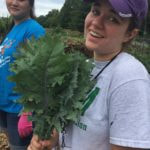“Everyone is hungry for something, and everyone has something to give.” This is one of the core values of one of our worksites called The Lord’s Acre*. At Asheville Youth Mission, we have the pleasure of visiting their extensive and productive garden almost every week. In their mission to fight hunger in western North Carolina, they grow fresh, organic, healthy food that they then distribute to a handful of local agencies in Fairview, Black Mountain, and Asheville, completely free of charge. Our students get to spend the time we have there helping with weeding, harvesting, washing vegetables, and other garden upkeep tasks, in addition to participating in activities and discussion to learn more about hunger. At the Lord’s Acre, they have a very postcolonial take on the charity part of their mission. Many agencies, even with the best intentions, are set up for people to either be a “giver” or a “receiver” of benefits. For example, either you’re the one serving or being served in a soup kitchen. Either you’re the one with the privilege to volunteer your time or you’re the one those volunteers are there to help. It creates an unnecessary, unspoken divide between people. This system maintains that either you’re a “have,” or a “have not.” The reality is that it’s not that simple. There isn’t a line you can draw between people separating those with needs and those without, because no one fits neatly into either of those boxes. We’ve been taught that we should administer our good works if we’re able, feel good about it, and go home without receiving anything, because we’re not the “needy” ones. At the Lord’s Acre, the first half of their mantra is that “everyone is hungry for something.” That may manifest itself in a physical sense for a person who needs a meal, or it might manifest itself in an emotional sense for a person who needs a community. Some are hungry for beauty, and can be satisfied by the diversity of flowers amongst the garden beds. Some are hungry for education, and will find joy in learning about new growing techniques. For some, the biggest blessing is that the garden is growing food that can feed families. For others, the biggest blessing is that the garden is a place of stillness and peace in a world where those are becoming harder to find. “Everyone has something to give” is the simple yet radical second half of their slogan. It’s saying that no matter who you are, you have talents and qualities that are worthy of sharing. If you are on the receiving end of the food they grow, that doesn’t mean that should be your only role in the exchange. Maybe you have gardening experience and can come teach the staff something new. Maybe you have a strong body and can give your talent of strength to lift or move heavy equipment around the garden. Maybe you bring the gift of friendship and conversation to the garden, which adds to the community. It’s easy to appreciate the gifts and talents of our friends, family, and people close to our hearts. What’s harder for many people is to look at someone who is less resourced than they are and see a person of worth, who brings gifts and talents of their own to the table. Based on the “have/have not” model, we’ve been taught that people with the ability to be charitable should do so, and that the beneficiaries of that charity should be grateful, and everyone goes home unchanged. Instead, we should meet people where they are (housed/unhoused, educated/vocational worker/unemployed, master gardener/beginner) value whatever it is that they bring to the community (wisdom, humor, financial support, diversity, storytelling, love of the outdoors) and partake in learning from and working alongside each other. For too long I thought I wasn’t hungry because I never went to bed on an empty stomach. Turns out, as I make my way around Asheville this summer, I am starving, and I meet people every day in the community who share their gifts and stories with me, and allow me to share mine with them. This is give and take. This is community. *The Lord’s Acre is undergoing a renaming this summer, so depending on when this article is being accessed, they might be under their new name, Root Cause Farm.
0 Comments
Leave a Reply. |
Archives
July 2024
Categories |
Youth Mission Co
Contact UsPO Box 2988
Asheville, NC 28802 (828 )231-4635 Mon - Fri 9 am - 5 pm EST |
SIGN UP FOR YMCO NEWSLETTER |
© Youth Mission Co. All rights reserved.

 RSS Feed
RSS Feed
